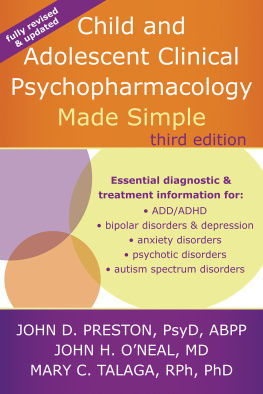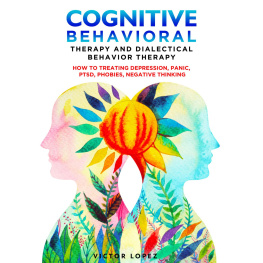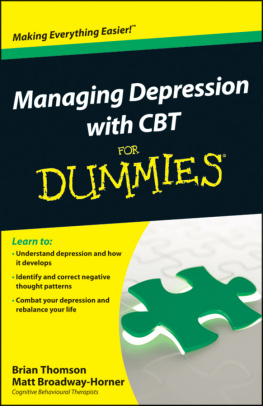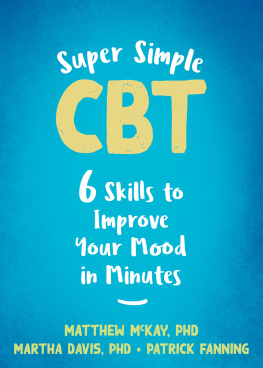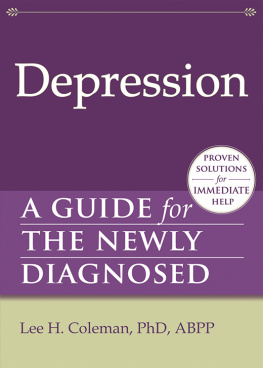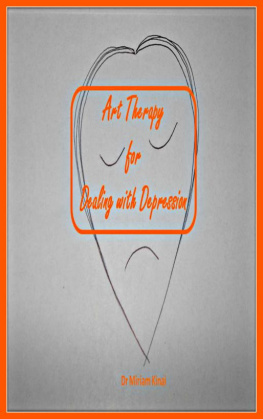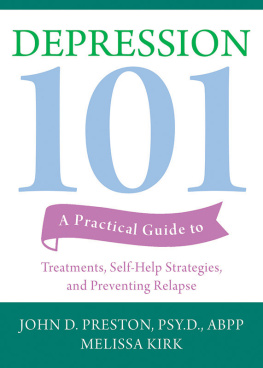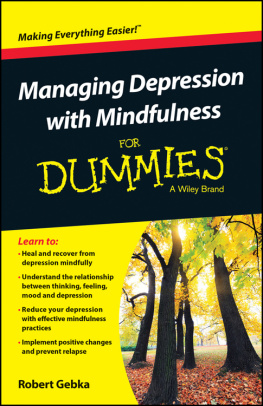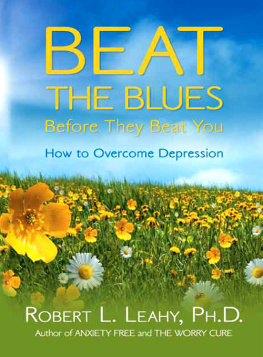Acknowledgments
Id like to express my gratitude to Kayla Sussell for the many years of her excellent help in editing my books.
John D. Preston
Thank you to everyone at New Harbinger, and to John Preston, for giving me the opportunity to work on this important book.
Melissa Kirk
Appendix A
Medical Disorders That Can Cause Depression
- Addisons disease
- AIDS
- Anemia
- Asthma
- Chronic fatigue syndrome
- Chronic infection (mononucleosis, tuberculosis)
- Chronic pain
- Congestive heart failure
- Cushings disease
- Diabetes
- Hypothyroidism
- Infectious hepatitis
- Influenza
- Malignancies (cancer)
- Malnutrition
- Multiple sclerosis
- Parkinsons disease
- Porphyria
- Premenstrual dysphoria
- Rheumatoid arthritis
- Sleep apnea
- Syphilis
- Systemic lupus erythematosus
- Ulcerative colitis
- Uremia
Appendix B
Drugs That Can Cause Depression
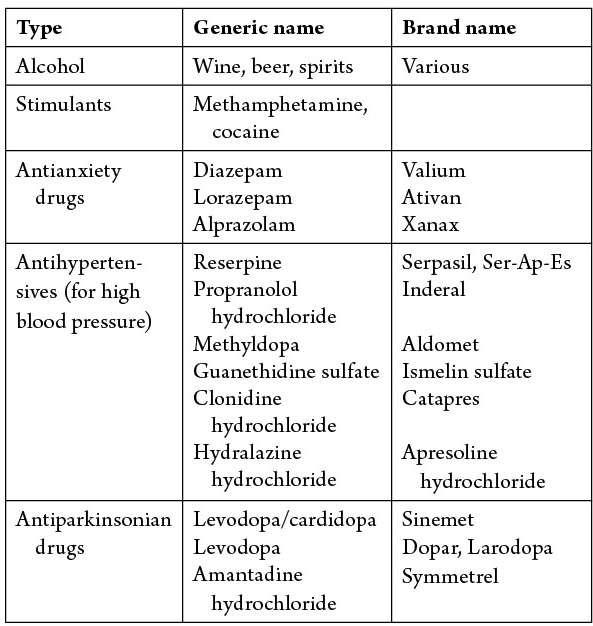
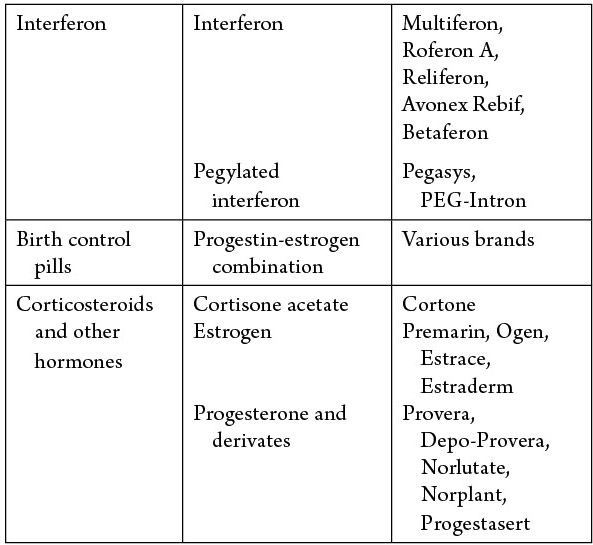
Often when people are treated with a number of prescription drugs, there can be drug-drug interactions that cause depression. If you are taking a number of prescription drugs and experiencing depression, please speak to your physician or pharmacist about the possibility that drug interactions may be causing or contributing to your depression.
John D. Preston, Psy.D., ABPP, is professor emeritus at Alliant International University in Sacramento, CA. He is author of twenty books and the Drugs in Psychiatry chapter in The Encyclopedia Americana. He lectures internationally.
Melissa Kirk is a writer and editor living in the San Francisco Bay Area who has personal experience with depression and has successfully used many of the techniques in this book.
Chapter One
The Challenge of Depression
When you have depression, you may feel so low that you can never imagine getting out from under the blackness of your mood. Every decision may seem both monumental and pointless, and on top of that, there are so many books, websites, advertisements, talk shows, and advice columns out there, all telling you the best way to treat your depression, that the information overload may seem confusing and overwhelming. Television commercials say the best way to feel better is to take a pill and make the pain go away; the thick workbooks at the bookstore all promise a quick cure using their particular treatment method; therapists use a confusing alphabet soup of acronyms, and each seems to offer a different type of therapy; and the health-food stores offer shelves and shelves of supplements, herbs, and pills that all say they can help heal depression.
Youve also heard that exercise, yoga, meditation, and hypnosis can help. Your friends and family may be telling you to just snap out of it, that you just need to try harder, or that things really arent that bad. You may even feel as if theres no way to sort through the confusion to find the best treatment for yourself. But there is a way. In this chapter, well provide a short overview of the treatments that have been found to be the most effective for treating depression.
Getting a Diagnosis
With depression, the most important first step is to get an accurate diagnosis. Note that certain physical health conditions can cause feelings of sadness, lethargy, and lack of motivation, so its important to first make sure that what youre experiencing is, in fact, depression. For example, in the introduction, we discussed how depression differs from other disorders, such as bipolar disorder. Regardless of whats going on, if youre feeling so down that you picked up this book, most likely you would benefit from seeing a health practitioner as your first step toward feeling better.
Several practitioners can diagnose depression. If you have a medical doctor you see regularly, he or she can rule out any medical conditions and can screen you for depression or other common mental health issues. Since depression is so common, many general practitioners and family practice doctors now screen patients for depression as a normal part of any health checkup. Your doctor can then give you a referral to a psychotherapist or support group and to other resources you can go to for help. You can also seek out a psychiatrist, who can prescribe medications for your depression if you both decide thats the best option. A clinical psychologist or licensed therapist is also qualified to make a diagnosis of depression. All of these health care professionals can then help you decide the best way to begin treatment.
Seeking Treatment
Once youre sure you have clinical depression and not another disorder or a physiological problem, the next step is to decide which treatment is the best option for you. With depression, the best way to get better is to seek more than one type of treatment and to combine treatment with lifestyle changes, such as getting enough sleep and exercise, eating right, and dealing with issues that may be linked to depression, such as substance abuse. You may decide to take an antidepressant as well as to find a therapist to teach you better coping skills. Or you may decide to try Saint-Johns-wort and a fish-oil supplement, join a yoga class, or join a support group especially for people with depression. Every person with depression will have a different path to mental wellness, so youll need to be persistent in exploring your options until you find a combination that works well for you. If something doesnt seem to be working, its okay to try something else instead, as long as you give the first method a chance to work. Well discuss proven treatment methods in the following pages.
Medications
There are many different types of antidepressants on the market. If you decide to use prescription medication, its important that you work with your medical provider to find the right medication, or combination of medications, and the right dosage for yourself. Report any symptoms or troubling side effects in detail to your medical provider, and be aware that most antidepressants can take between two to six weeks to work. Also bear in mind that about 25 percent of those who ultimately have a good response to antidepressants require eight to ten weeks of treatment before their symptoms go away (Preston, ONeal, and Talaga 2010). If you dont immediately feel better, be sure that youve given the medication enough time to have an effect.
Its also important to never stop taking your medications suddenly, as this may cause withdrawal symptoms or trigger the return of a depressive episode. Always work with your health care provider to decide when and how to discontinue your medications. The most commonly used types of antidepressant medications are described below.
Prescription Medications
Whether or not to use antidepressant medications is perhaps the most controversial aspect of depressive illness. Almost every day theres a story in the popular media about the dangers of antidepressants or a report of yet another research study that questions the efficacy of a particular antidepressant. And even though antidepressant use is soaring in the United States, there is still a stigma about admitting youre taking them. In spite of the stigma, antidepressants can and do work for most people with depression. With proper treatment, antidepressants are effective for about 70 percent of those treatedeven those with serious depressions. They can be a lifesaving first step in stabilizing mood, especially when your depression has affected your functioning to the extent that you are in danger of losing your job or an important relationship, or you are at risk of harming yourself (Agency for Health Care Policy and Research 1999).


